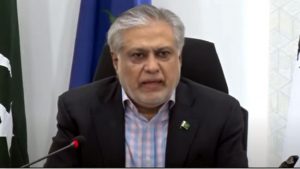Dar disclaims once more any chance of default.
The country’s finance minister has pledged to implement reforms for its “long-term improvement.”

ISLAMABAD — Pakistan’s finance minister, Ishaq Dar, has once again dismissed the prospect of a default and pledged reforms for the country’s “long-term improvement” in a speech delivered on Saturday.
The financial czar assured a delegation from the Karachi Chamber of Commerce and Industry that they would work together to get the country out of its economic crisis during a meeting in Islamabad.
Dar added that the Ministry of Finance would usher in a new era of agricultural prosperity and create a national wealth fund. He added that he is determined to take measures that were overlooked in the past, and that the IT industry would also be a focus.
The minister of finance further explained to the team that there is “no technical reason behind” the unusual delay in the IMF program.
He defended Pakistan’s independence by saying the country possesses trillions of dollars’ worth of assets.
Dar further said that while the country’s external liabilities are over $100 billion, the value of the country’s only asset, its gas infrastructure, is around $40–$45 billion.
The finance minister also assured the business community that the government would work with them if they made legitimate expectations in regards to the future budget.
Dar’s remarks come after a cabinet member stated the previous day that Pakistan’s plea to reduce the necessity of arranging $6 billion in new loans had been denied by the global lender, leaving the government with no choice except to try to resurrect the arrangement.
Dr. Aisha Pasha, Pakistan’s Minister of State for Finance, made it clear that going back to the IMF was the country’s last resort in a policy statement before the National Assembly Standing Committee on Finance.
In light of updated information on Pakistan’s current account deficit, Dr. Pasha claims his country asked the IMF to consider lowering its $6 billion external funding requirement. She said that it had been agreed to arrange $3 billion before the staff-level agreement and the remaining $3 billion after the agreement, but that the IMF was insistent on “demonstrating the $6 billion.”
According to the finance minister’s statement, the IMF’s position has not changed despite Prime Minister Shehbaz Sharif’s phone call to IMF Managing Director Kristalina Georgieva.
The International Monetary Fund has disbursed $3.9 billion during the past four years, out of a total bailout package of $6.5 billion, with the remaining amount dependent on the results of three outstanding assessments.









































